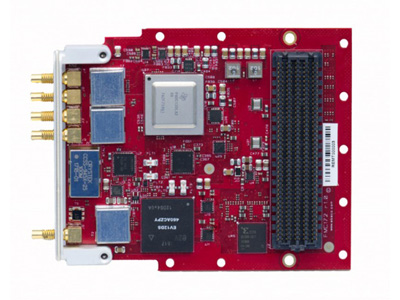Abaco Systems has announced a software-defined radio (SDR) module, the FMC172, designed for advanced embedded computing applications in electronic warfare (EW), digital radar, wide band receivers and wireless communications.
The SDR module integrates industry-leading ADC and DAC functionality on a single card, using the latest high performance ADC from Texas Instruments and DAC devices from E2V. It is the fastest ADC Abaco offers with LVDS interfaces, delivering up to 6.4 GSPS analog-to-digital conversion on a single channel, or two channels at 3.2 GSPS. The DAC runs at up to 6 GSPS, making it among the fastest low-latency devices available.
The combination of the FMC172’s > 6 GHz bandwidth, high sample rate and low latency is ideal for advanced digital RF memory (DRFM) systems. When paired with Abaco’s FPGA carrier cards, such as the VP889 or VP869, the FMC172 provides a platform to solve some of the most difficult challenges when designing modern DSP systems.
The FMC172 allows flexible control of clock source, sampling frequency and calibration through I2C communication. The ADC has individual calibration circuits for fine tuning gain, offset and phase. The card is equipped with power supply and temperature monitoring and offers several power-down modes to switch off unused functions or protect the card from overheating.
“The FMC172 provides customers with yet another option to expand bandwidth for analog receivers and transmitters. Our previous generation FMC170 supported one channel at 5 GSPS in both input and output; the FMC172 extends this to 6.4 GSPS at 10-bits or two ADC channels at 3.2 GSPS. Many customers have monolithic FPGA with ADC cards in use, and it is challenging to update such a design to the latest ADC and DAC technology as moving forward would often require a complete board/system redesign. The FMC172 is a prime example of how the evolving FMC standard allows customers who invest in this powerful mezzanine-based architecture can continue to evolve their analog I/O FPGA based systems with minimal changes to their existing DSP and FPGA architecture. As such, it is very much aligned with our philosophy of providing our customers with a straightforward migration path that enables them to easily leverage the higher performance that new technologies bring.” — Peter Thompson, VP, product management at Abaco Systems

